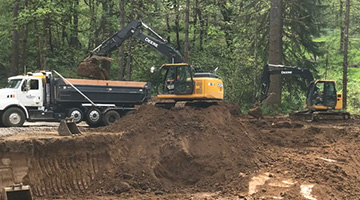Professional Septic Ohio - Trusted Septic Tank Specialists in Ohio
Professional Septic Ohio - Trusted Septic Tank Specialists in Ohio
Blog Article
Comprehensive Excavation Strategies: Understanding the Basics for Success
In the world of building and construction and civil engineering, the relevance of effective excavation methods can not be overstated. The careful preparation, specific execution, and precise interest to information required in excavation projects demand a thorough method that includes various fundamental elements. From first dirt evaluation to the application of precaution and routine progress tracking, grasping these core components is important for accomplishing success in any kind of excavation undertaking. Nonetheless, the true mastery lies not merely in understanding these fundamentals however in effortlessly incorporating them to browse the intricacies of excavation jobs with skill.
Recognizing Excavation Task Planning

The first stage of any kind of excavation project is the planning stage, where crucial choices are made that can considerably affect the result of the job. Recognizing the task spending plan, timeline, and extent constraints is important for producing a thorough excavation plan that ensures the job's success.
One key element of excavation project preparation is the advancement of a comprehensive timeline that outlines the series of activities, turning points, and due dates. This timeline offers as a roadmap for the job team, allowing them to track progress and make essential changes to make certain the task remains on routine. Additionally, a well-defined spending plan that represents all costs, including tools service, labor expenses, and materials, is necessary for preventing cost overruns and hold-ups. By meticulously thinking about all these elements throughout the drawing board, excavation jobs can be performed successfully and successfully, resulting in effective results.
Dirt Evaluation and Site Examination
Performing extensive dirt evaluation and site assessment is a critical step in the prep work stage of any kind of excavation project. Soil evaluation entails determining the structure, structure, and residential or commercial properties of the dirt at the excavation website. This details is crucial for comprehending the soil's bearing capability, dampness web content, and potential for erosion, which are key consider figuring out the excavation approaches and tools required for the task.
Website evaluation surpasses soil analysis and encompasses a broader assessment of the general site conditions. This assessment consists of determining any type of prospective threats, such as below ground energies, ecological problems, or unpredictable surface, that can affect the excavation process. By completely assessing the site, project managers can create reliable excavation strategies that prioritize safety and security, effectiveness, and environmental management.
Utilizing advanced modern technologies like ground-penetrating radar, dirt tasting, and drone surveys can enhance the precision and performance of soil analysis and website analysis. Investing time and resources in these initial actions can ultimately save time and protect against expensive delays or complications throughout the excavation process.
Equipment Option and Application
Effective excavation jobs count greatly on tactical tools choice and usage to make certain ideal performance and performance. Choosing the right tools for the task is essential in optimizing efficiency and decreasing downtime. Aspects such as the kind of soil, deepness of excavation, and job extent play a considerable role in establishing the most ideal equipment for the job at hand.

In addition to selecting the suitable tools, proper usage is essential to project success. Operators should be trained to deal with the devices safely and efficiently - dump truck companies in ohio. Normal upkeep checks and prompt repair services assist stop malfunctions and make sure constant performance throughout the project
Precaution and Rules Conformity
In the realm of excavation projects, prioritizing safety measures and conformity with laws is vital to guaranteeing a safe and legally audio functional atmosphere. Precaution incorporate a variety visit this site of practices, consisting of performing complete site assessments, applying appropriate signs and obstacles, and offering ample safety and security training for all personnel associated with the excavation procedure. Adherence to policies, such as OSHA needs in the United States, guarantees that the excavation project fulfills the required criteria to secure workers, onlookers, and the surrounding atmosphere.

Tracking Development and Adjusting Approaches
Just how can forecast supervisors successfully track the development of excavation projects and adjust their approaches as necessary to optimize results? Monitoring progression is crucial for ensuring that excavation projects remain on track and meet target dates. Job managers can use different devices and strategies to track progress, such as day-to-day development records, official website routine website assessments, and advanced monitoring technologies like drones and general practitioners tracking systems. By continuously keeping track of the task's improvement, managers can determine any prospective hold-ups or problems beforehand and take proactive actions to address them.

Final Thought
In final thought, grasping the fundamentals of detailed excavation approaches is important for the success of any project. By recognizing job planning, assessing soil and website conditions, selecting ideal equipment, complying with safety guidelines, and keeping an eye on development, project supervisors can guarantee a smooth and efficient excavation process. Applying these techniques will certainly result in effective outcomes and decrease prospective threats or problems throughout the excavation project.
The first phase of any kind of excavation task is the planning phase, where important choices are made that can substantially impact the outcome of the project. go Recognizing the project budget plan, timeline, and range restraints is vital for developing an extensive excavation plan that makes certain the project's success.
How can forecast supervisors properly track the development of excavation jobs and adjust their strategies accordingly to enhance results? By carefully monitoring development and being ready to adjust strategies, job managers can boost the total success of excavation tasks.
By understanding project preparation, analyzing soil and site problems, picking suitable tools, complying with safety policies, and keeping track of development, job managers can guarantee a smooth and effective excavation process.
Report this page